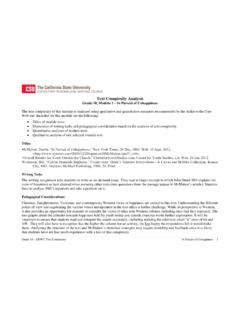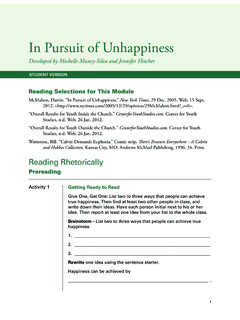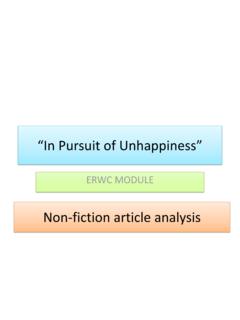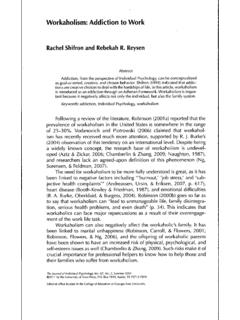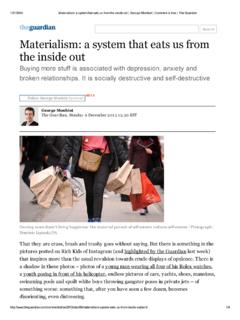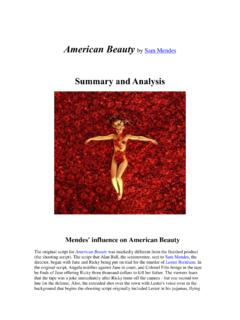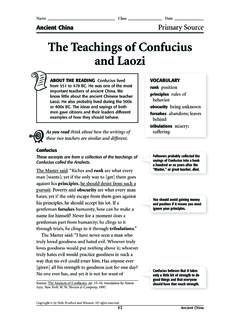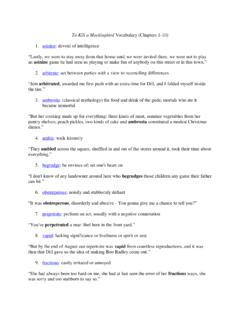Transcription of Brave New World - Weebly
1 1 Brave New World LRJ Mr. Rose Brave New World Literary Response Journal Prompts Each response should be thoughtful and well-developed. 2-3 pages in your LRJ per response is the proper range. Remember: Your LRJ will be collected and the day of the BNW in-class essay for completeness, thoughtfulness, neatness (legibility!), and overall effort. 1. Mood-Altering Drugs and Happiness Consider this quotation from Brave New World : "Christianity without the tears - that's what soma is." In Brave New World Aldous Huxley warns of the dangers of mood-altering drugs, but our society in recent decades has failed to heed the warning because antidepressants and similar mood-altering drugs are being used today, much like Soma, to make people less of a "burden" on society. Research some of the commonly prescribed mood-altering drugs of the day, , Prozac, Xanax, etc. and read the article Forced Smiles from The New Criterion (see article below).
2 Note the positive effects as well as the negative side effects and other unintended consequences of using various prescription mood-altering drugs. Then answer this question: Do you support the prescription and use of mood-altering drugs? (Feel free to qualify your answer; it does not have to be a black-and-white yes or no response.) In general, are these soma-style drugs good for the individual? For society? Explain your response with facts, details, and examples from your research. 2. Mindless Entertainment: Amusing Ourselves to Death The following quotation comes from the foreword to Neil Postman's 1985 book Amusing Ourselves to Death, comparing George Orwell's 1984 to Huxley's Brave New World : Contrary to common belief even among the educated, Huxley and Orwell [author of 1984] did not prophesy the same thing. Orwell warns that we will be overcome by an externally imposed oppression.
3 But in Huxley's vision, no Big Brother is required to deprive people of their autonomy, maturity, and history. As he saw it, people will come to love their oppression, to adore the technologies that undo their capacities to think. What Orwell feared were those who would ban books. What Huxley feared was that there would be no reason to ban a book, for there would be no one who wanted to read one. Orwell feared those who would deprive us of information. Huxley feared those who would give us so much that we would be reduced to passivity and egoism. Orwell feared that the truth would be concealed from us. Huxley feared the truth would be drowned in a sea of irrelevance. Orwell feared we would become a captive culture. Huxley feared we would become a trivial culture, preoccupied with some equivalent of the feelies, the orgy porgy, and the centrifugal bumblepuppy. As Huxley remarked in Brave New World Revisited, the civil libertarians and rationalists who are ever on the alert to oppose tyranny failed to take into account man s almost infinite appetite for distractions.
4 In 1984, Huxley added, people are controlled by inflicting pain. In Brave New World , they are controlled by inflicting pleasure. In short, Orwell feared that what we hate will ruin us. Huxley feared that what we love will ruin us. None of what they feared is mutually exclusive. All sides are present today. We are a captive culture (Madison Avenue). We are a trivial culture (the television programs the public prefers). So on for the other fears. In short, Orwell feared that what we hate will ruin us. Huxley feared that what we love will ruin us. According to Postman, what is a Huxleyan future? In your educated opinion, in what ways does our country and culture resemble Huxley s prophecy in Brave New World as Postman articulates it? Be specific. Use details and examples. Consider the various ways we amuse ourselves these days cable television, internet, video games, virtual realities, etc.
5 How might these forms of amusement be having a negative impact on us and our society? 2 Brave New World LRJ Mr. Rose 3. The Myth of Malthus & Human Poverty One issue dealt with by Aldous Huxley in Brave New World is strict control of World population. The one World government of Huxley s dystopia has complete control over every birth and every death. Huxley, more or less, predicted the Nazi eugenics campaign, forced sterilizations, government-funded contraception, and China s one child policy as ways of limiting population growth. Moreover, a mainstream contemporary mindset supports many of these measures, assuming that surging human population is the real root of the World s evils, from global warming to poverty, from starvation to habitat loss. Not so fast. Three recent books by renowned experts on the subject paint a far more complex portrait of the World s population and what it portends ( , Sept.)
6 17, 2008). Read S. Michael Craven s The Myth of Overpopulation (see article below) and watch the five POP101 animations episodes at , and then respond to the following questions: Is population control a solution to global human poverty? Does a higher population increase poverty levels? Explain why or why not. Who are Thomas Malthus and Charles Darwin? What do they have to do with the myth of overpopulation ? What, in your educated opinion, is the solution to ending global human poverty? 4. Action T4 Euthanasia Project Research the Nazi T4 program and then respond to the following prompts in your LRJ entry: What is euthanasia as defined by the Nazis? What was the purpose of the T4 program? What were the results? What role did propaganda play in carrying out the goals of the T4 program? And finally, what similarities do you see in our 21st century culture? You may find the following links helpful in completing this response: Introduction to Nazi Euthanasia: Nazi Propaganda Against the Disabled: Nazi Euthanasia Program: +Doc-Jews-Holocaust- Accompanying Articles: Forced Smiles: A review of Artificial Happiness: The Dark Side of the New Happy Class by Ronald W.
7 Dworkin by Theodore Dalrymple The New Criterion, September 2006 The word unhappy has almost been banished from our vocabulary. It has been replaced by the word depressed. For every patient who confesses to unhappiness, a thousand now claim to be depressed. What was once considered to be an inescapable part of the human condition has been elevated (or is it reduced?), by a semantic change, to an illness. And since good health care is now regarded as a right, the corollary of unhappiness being an illness is that people believe themselves to be entitled not merely to the pursuit of happiness, but to the thing itself. A right being unconditional (or else it would not be a right), the pursuit of happiness must therefore always end in success, rather as the bear-hunting of such leaders as Brezhnev and Ceausescu had always to end in ursine slaughter, thanks to the minions who drove tranquilized bears to be mown down at point-blank range by the leaders.
8 The pride of Brezhnev and Ceausescu in their hunting prowess was ersatz, of course, and the author of this book contends that much of our contemporary happiness is likewise ersatz. 3 Brave New World LRJ Mr. Rose It is Dr. Dworkin s argument that doctors have been complicit, or at least instrumental, in bringing about this widespread state of ersatz happiness. His analysis does not always make it clear whether he believes that doctors have been the conscious originators of, or mere blind participants in, this development, which he says is pregnant with problems for society. He foresees a time when the population will consist entirely of blandly contented people who have no concern for one another, or indeed for anything other than the continuation of their own vacuous, artificial happiness. A society composed of such people would not only be decadent and defenseless, but scarcely worth defending.
9 According to Dr. Dworkin, doctors have helped to spread a state of artificial happiness in three connected ways. First, they have responded to the public s dissatisfaction with the decline of personal doctoring (the result of the ever-increasing technological sophistication of medical practice) by accepting that unhappiness is a medical condition brought about by chemical imbalance in the brain, to be righted by drugs such as Prozac, which they then prescribed in vast quantities. Second, they neutralized the threat posed to orthodox medicine by alternative medicine, whose very irrationalism appealed to a population avid for a spiritual dimension to life, but unwilling to submit to the discipline of genuine religious belief, by cynically accepting it into the hospital fold and thereby co-opting and taming it. Alternative medicine works, to the extent that it does work, by inducing a state of anodyne, complacent, and almost decerebrate contentment in its clientele: a state of mind, or of no mind, much less threatening, and more lucrative, to doctors than that of critical intelligence.
10 Third, and finally, doctors came to accept that prevention and not just cure was part of their duty towards their patients, and that therefore the management of lifestyle for example, by recommendation of strenuous exercise was an essential component of medical practice. People who carried out or even over-fulfilled doctors orders began to see themselves as not merely prudent with regard to their health, but virtuous in the moral sense, and with their virtue went another form of artificial happiness, the beatific knowledge that they were doing the right thing no matter how painful. The medical profession has thus promoted and benefited from the notion that the attainment of happiness can, and indeed ought to be, detached from the way life is lived, apart from taking tablets and exercise under its direction. It has thereby achieved an unassailable position as the arbiter the sole arbiter of how life should be lived, only a few short decades after its wisdom and achievements were coming under sustained attack from skeptics, sociologists, historians, philosophers, and the like.
